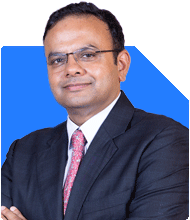Ramalingam Kalirajan |9569 Answers |Ask -Follow
Mutual Funds, Financial Planning Expert - Answered on May 29, 2024
He has an MBA in finance from the University of Madras and is a certified financial planner.
He is the director and chief financial planner at Holistic Investment, a Chennai-based firm that offers financial planning and wealth management advice.... more

Sir, with my existing SIP I have corpus of Rs. 20.50 lakh, but as on since 3 month my SIP is stopped due to irregular monthly income. What I should do with my SIP whether I resume my SIP anyhow (Rs.13000 monthly) , is this the right time as the market is on all time high. My age is 43. please suggest.
As a Certified Financial Planner, I understand the importance of making informed decisions about your investments, especially when facing uncertainties like irregular income and market highs. Let's delve into your situation to find the best course of action.
Assessing Your Current Financial Standing
Firstly, congratulations on building a corpus of Rs. 20.50 lakh through your SIP. This demonstrates your commitment to long-term financial planning and investment discipline, which are crucial for achieving your goals.
However, it's understandable that you've had to pause your SIP due to irregular income. Financial stability is paramount, and it's prudent to prioritize meeting your immediate financial needs before resuming investments.
Understanding Market Dynamics
You rightly point out that the market is currently at an all-time high. This presents both opportunities and risks for investors. While high market levels may tempt some to hold off on investing, it's essential to remember that timing the market is notoriously difficult.
Market timing relies on predicting short-term fluctuations, which is often a futile exercise. Instead, a disciplined approach of regular investing, such as through SIPs, can help mitigate the impact of market volatility over the long term.
Analyzing the Pros and Cons of Resuming Your SIP
Resuming your SIP of Rs. 13,000 per month requires careful consideration. Here's an evaluation of the pros and cons:
Pros:
Dollar-cost averaging: By investing a fixed amount at regular intervals, you purchase more units when prices are low and fewer units when prices are high. This strategy can help smooth out market volatility over time.
Discipline: SIPs instill discipline by automating your investments, regardless of market conditions or fluctuations in income.
Long-term focus: At 43, you have several years until retirement. Continuing your SIP aligns with your long-term financial goals, allowing your investments to potentially grow over time.
Cons:
Market highs: Investing at market peaks may lead to short-term fluctuations in the value of your investments. However, focusing on long-term goals can help mitigate this risk.
Irregular income: If your income remains unpredictable, committing to a fixed SIP amount may strain your finances during lean months.
Considering Alternatives
If the irregularity of your income persists, you may explore alternatives to traditional SIPs. For instance, you could opt for flexible SIPs that allow you to vary your investment amount based on your monthly income.
Additionally, you might consider building an emergency fund to cover expenses during periods of irregular income. This fund can provide a financial buffer, reducing the need to dip into your investments during challenging times.
Seeking Professional Advice
As a Certified Financial Planner, I'm here to provide personalized guidance tailored to your unique circumstances. I can help you reassess your financial goals, evaluate investment options, and devise a strategy that aligns with your current financial situation and long-term objectives.
Ultimately, the decision to resume your SIP depends on various factors, including your income stability, risk tolerance, and investment horizon. By weighing the pros and cons carefully and seeking professional advice, you can make informed choices that contribute to your financial well-being.
Best Regards,
K. Ramalingam, MBA, CFP,
Chief Financial Planner,
www.holisticinvestment.in
You may like to see similar questions and answers below
Abhishek Dev | Answer |Ask -Follow
Financial Planner - Answered on Sep 13, 2023
Ramalingam Kalirajan |9569 Answers |Ask -Follow
Mutual Funds, Financial Planning Expert - Answered on May 06, 2024
Samraat Jadhav |2376 Answers |Ask -Follow
Stock Market Expert - Answered on May 07, 2024
Ramalingam Kalirajan |9569 Answers |Ask -Follow
Mutual Funds, Financial Planning Expert - Answered on Sep 22, 2024
Nayagam P P |8388 Answers |Ask -Follow
Career Counsellor - Answered on Jul 10, 2025
Nayagam P P |8388 Answers |Ask -Follow
Career Counsellor - Answered on Jul 10, 2025
Nayagam P P |8388 Answers |Ask -Follow
Career Counsellor - Answered on Jul 10, 2025
Nayagam P P |8388 Answers |Ask -Follow
Career Counsellor - Answered on Jul 09, 2025
Nayagam P P |8388 Answers |Ask -Follow
Career Counsellor - Answered on Jul 09, 2025
Nayagam P P |8388 Answers |Ask -Follow
Career Counsellor - Answered on Jul 09, 2025
Nayagam P P |8388 Answers |Ask -Follow
Career Counsellor - Answered on Jul 09, 2025
Nayagam P P |8388 Answers |Ask -Follow
Career Counsellor - Answered on Jul 09, 2025
Nayagam P P |8388 Answers |Ask -Follow
Career Counsellor - Answered on Jul 09, 2025
Nayagam P P |8388 Answers |Ask -Follow
Career Counsellor - Answered on Jul 09, 2025




















